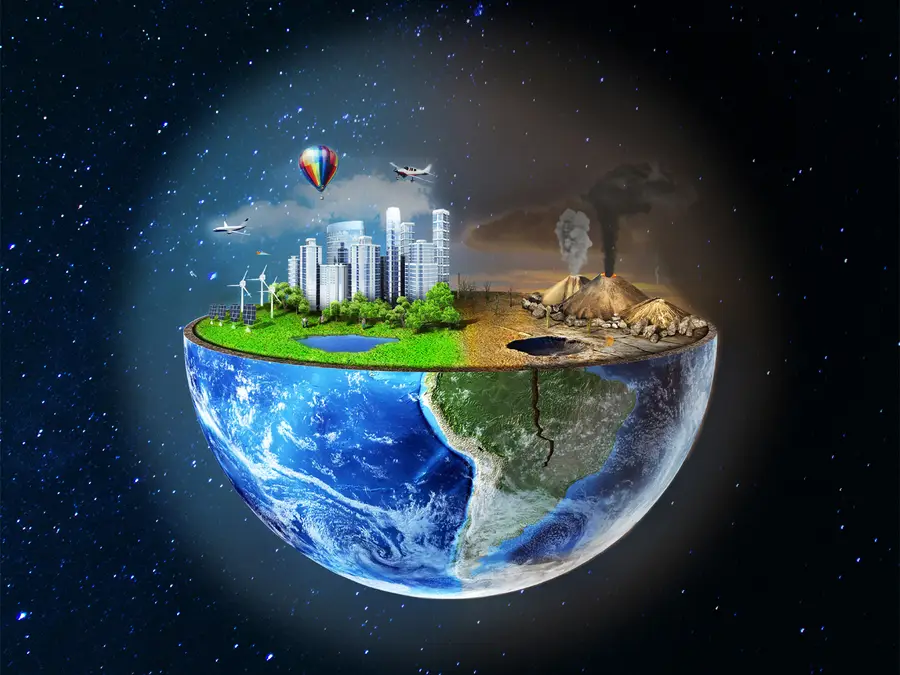Photo by Sadock Mugeta for RTI International
We are learning this lesson the hard way: What human beings do on this planet affects all living beings and the environments on which they rely for survival. Animals, plants, microbes, and humans are all connected, and our anthropocentric actions have already had massive repercussions for our climate, our health, as well as our economies and security at a local, regional, and global level.
That “big picture” philosophy is embodied in the ever-evolving field of Planetary Health, which refers to the health of the human civilization and the natural systems upon which it depends. A Planetary Health Approach illuminates the relationships between factors and acknowledges that we are not just interconnected but interdependent. In other words, it tells us simply that saving the planet saves ourselves.
Unlike other approaches that can be applied to conservation, Planetary Health provides an appreciation for the true complexity of our existence on earth. It reminds us that countries want to both conserve their resources and use them to develop their infrastructure and economy. It encourages us to strike a balance.
While thinking holistically may sound daunting (or beyond the scope of an individual donor-funded program), it doesn’t have to be. RTI International has been examining the Planetary Health Approach for some time, and with integrated approaches gaining more traction, the possibilities for taking a more holistic and comprehensive approach are growing exponentially.
Planetary Health at the Program Level
This all sounds nice, and seems logical in theory. Yes, let’s think holistically! But how?
Here are some practical steps to get you thinking through a Planetary Health Approach lens:
The first step is asking:
- Are there factors we are not considering that do contribute to the issues we’re trying to address?
- If so, how does thinking through a Planetary Health Approach potentially change our implementation? Is this new approach still realistic? Practical? Acceptable?
The second step is learning:
- In program design, Political Economy Analysis is becoming ever more fine-tuned as organizations seek a deep understanding of the conditions that have shaped the problem or hindered its solutions.
- Engage unconventional representatives or partners who can provide another perspective with which to view the issues at-hand. While there may be a focus to your program and certain restrictions based on the funding streams that support it, understanding the issues at a fundamental, practical level from parties who are also directly or indirectly affected can lead to more effective interventions.
The third step is including:
- A Planetary Health Approach invariably involves governments and ensures inclusive governance; representatives from civil society, the private sector, and marginalized and indigenous groups must join governing bodies in the decision-making process.
- Private sector actors (and perhaps some of those unconventional partners above) serving as long-term, engaged stakeholders with a “seat at the table” are an integral part of the solution, with results that can benefit all.
- Other implementing partners, programs, and donors, particularly those who may be indirectly affected, can provide different views.
- Multidisciplinary, cross-sector teams can bring more skills and ideas to the table and respond to issues that may not be suitable for your scope of work or budget.
The Planetary Health Approach in Action
In many of our programs, we are beginning to see how a Planetary Health Approach plays out in addressing natural resources management, biodiversity conservation, and environmental crime.
One example is USAID’s Philippines Sustainable Interventions for Biodiversity, Oceans, and Landscapes (SIBOL) Activity, which is explicitly anchored in the Planetary Health Approach. The program has a focus on conservation, but we wanted to ensure the decision-making table was inclusive and brought together the right mix of affected parties, and that we “counted what counts” for natural resource management. So we conducted a robust national and site-level applied Political Economy Analysis that intentionally asked outside-the-box questions about the power dynamics at play in efforts to both conserve resources and use them for economic advancement.
By gathering information that was beyond the norm, we received some surprising feedback. The project’s conservation experts seized the opportunity to develop a much more effective approach to addressing the needs they identified—including some that were not on their radar before.
Asking “Who else could I include?” allows for holistic problem-solving at the project level. Perhaps an anthropologist could provide specialized guidance on the best way to engage an indigenous community whose natural resources are under threat, for instance.
Now consider the inverse as well. Asking, “Who am I unintentionally excluding?” is just as valuable a question. While everyone loves using the latest and greatest technology, does the use of that particular technology also limit that data set? Perhaps a survey released online means a cohort of key stakeholders’ responses are missing simply because of their limited access to the internet. Without their responses, the data set is essentially incomplete; and given the limitation, this is the definition of a marginalized group that is now not engaged. A Planetary Health Approach leads you to inquire more and assess your approach holistically, ultimately unveiling the connections between flora, fauna, communities, and development to help forecast the reactions to constant change.
We cannot ignore that our planet’s natural systems will continue to be transformed by humanity, and that human health, in turn, will be affected by the health of our planet. So, we must strive for a balance: ensuring we do not tip the scales by overstretching our natural resources with human demand. With integrated, inclusive problem-solving that considers the unending linkages of our world, I think we can strike that balance, together.



